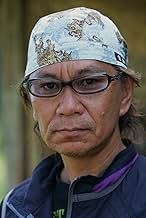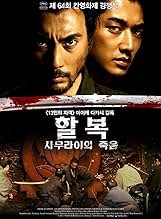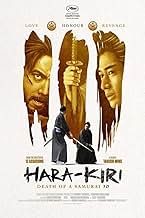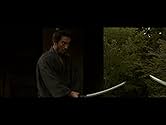CALIFICACIÓN DE IMDb
7.3/10
9.8 k
TU CALIFICACIÓN
Un samurai (Ebizô Ichikawa) pide permiso para cometer un suicidio ritual en la tierra de un prominente señor feudal y escucha la horripilante historia de lo que le sucedió a un camarada que ... Leer todoUn samurai (Ebizô Ichikawa) pide permiso para cometer un suicidio ritual en la tierra de un prominente señor feudal y escucha la horripilante historia de lo que le sucedió a un camarada que hizo una petición similar varios meses antes.Un samurai (Ebizô Ichikawa) pide permiso para cometer un suicidio ritual en la tierra de un prominente señor feudal y escucha la horripilante historia de lo que le sucedió a un camarada que hizo una petición similar varios meses antes.
- Dirección
- Guionistas
- Elenco
- Premios
- 6 nominaciones en total
Eita Nagayama
- Motome Chijiiwa
- (as Eita)
Gorô Daimon
- Priest
- (as Goro Daimon)
- Dirección
- Guionistas
- Todo el elenco y el equipo
- Producción, taquilla y más en IMDbPro
Opiniones destacadas
Where does mercy fit in with the esprit de corps of a warrior class? Can there be honor without it? These are interesting questions raised in director Takashi Miike's poignant remake of the 1962 classic "Harakiri". This film may not satisfy the audience for slashing, body-count samurai movies because the emphasis is on mood and character but there are a number of things to recommend this film. "Hara-Kiri:Death of a Samurai" is beautifully photographed by Nobuyasu Kita and has laudable performances. Ebizo Ichikawa is Hanshiro a samurai with a young daughter of marriageable age. Hanshiro has adjusted to living in a time of peace. He isn't a wealthy man but seems happy and content making a living doing the odd job here and there. Ichikawa is wonderful in this role giving great weight and humanity to the character. He is a memorable samurai. Eita is Motome a young samurai who hasn't adjusted as well. He has been unable to find employment and so enters the house of a great lord asking for permission to commit harakiri in the courtyard and thus achieve an honorable death. Hikari Mitsushima is very affecting as Hanshiro's daughter, Miho. When I approached the theater showing this film I noticed someone walking away with teary eyes. I can't recall the last time that happened but after seeing "Hara-Kiri:Death of a Samurai" I understood why someone would be so moved.
It's a good film. I didn't see the original and so I wasn't tainted by how they compare, or the book either. It probably made this film a little hard to understand because the chronology jumps around and there are a lot of flashbacks - but I stuck with it and it did begin to make sense. The movie is a basically a tragedy that also dissects the samurai code and provides some thought provoking material to consider. The movie is reasonably well paced and for a Japanophile the set design and costumes are very well done. I don't know if Japan was that squeaky clean and tidy 400 years ago, but it seemed well considered and accurate. The movie was a little slow but portrayed a sort of Zen tranquility, so it worked for the mood or atmosphere. You could pick apart this movie, and it may not stand up to the original but if you're a fan of Japanese cinema it's definitely worth seeing.
Takashi returns to the samurai world after the success of '13 assassins' in 2011. This movie was a remake of 1962 'Harakiri' which was also a massive hit movie. I have not seen the original but this movie blown me away. As usual the story opens slow and hard to identify the situation of the story but at the right middle of the movie the flashback strikes with awesome drama about poverty and family sentiment. Once the flashback was told you will easily say where the movie is heading. The story was classic and the movie was presented with rich cinematography. The first digital 3D movie for Takashi Miike as well the first 3D movie to premier at 2011 Cannes film festival.
You have to learn a word to understand the movie completely. 'Seppuku' - which means ritual suicide committed by a samurai. So that is why it's called 'Hara-kiri: death of a samurai'. You must have patience during opening sequences, without character and story development you will be in a tough position to understand about what's going on. While the story and character progress with the development you will start to get and you may fall for the emotion parts if you are a tenderhearted. And also you will be uncomfortable during 'seppuku' scene.
Takashi Miike's career best, this is what already everyone saying about it. But Its to hard to say which was his best, I like many of his works. I might be overwhelmed by the watch but will be happy to recommend it to others. I was very little unhappy for the ending scene otherwise I could have said it is the best of Takashi's work.
I am so curious about Takashi Miike's upcoming and Hollywood debutante project 'The outside' with Tom Hardy. Expecting it would be another 'The last samurai', I wish a good luck to the team.
You have to learn a word to understand the movie completely. 'Seppuku' - which means ritual suicide committed by a samurai. So that is why it's called 'Hara-kiri: death of a samurai'. You must have patience during opening sequences, without character and story development you will be in a tough position to understand about what's going on. While the story and character progress with the development you will start to get and you may fall for the emotion parts if you are a tenderhearted. And also you will be uncomfortable during 'seppuku' scene.
Takashi Miike's career best, this is what already everyone saying about it. But Its to hard to say which was his best, I like many of his works. I might be overwhelmed by the watch but will be happy to recommend it to others. I was very little unhappy for the ending scene otherwise I could have said it is the best of Takashi's work.
I am so curious about Takashi Miike's upcoming and Hollywood debutante project 'The outside' with Tom Hardy. Expecting it would be another 'The last samurai', I wish a good luck to the team.
It would've taken guts to remake one of the most acclaimed Japanese films of all time (1962's Harakiri), but then again, no one could accuse Takashi Miike of being a gutless filmmaker. I was curious to see this because some of Miike's best films are remakes or updates of stories that have already been adapted to film (like 13 Assassins and Graveyard of Honour).
This remake really follows the original perhaps a little too closely. I think it's just a few minutes shorter, and I can really only think of one scene that was in the original that wasn't in this. Visually, it replicates Masaki Kobayashi's style really well, but maybe part of me was hoping that Takashi Miike would do something a little more out-there or unexpected. Instead, he chose to be reverent to the original, but then again, it is a classic film that deserves reverence.
There's one infamous scene from the original that feels even harder to watch here, and I think the climax shakes things up a little too, to mixed effect (the final fight is fairly different). Otherwise, the story and all the characters are near-identical, and anyone familiar with the 1962 version is unlikely to find too many surprises here.
It's strange to try and review this, because it is a high-quality film... yet it's based on a high-quality classic that still holds up extremely well, so I'm not entirely sure what the rationale was behind this. For those who want to see a more modern-looking version of Harakiri in colour instead of black and white, this is very well-made and watchable, but I feel like the original is still more worthy of being watched first, for anyone unfamiliar with either film.
This remake really follows the original perhaps a little too closely. I think it's just a few minutes shorter, and I can really only think of one scene that was in the original that wasn't in this. Visually, it replicates Masaki Kobayashi's style really well, but maybe part of me was hoping that Takashi Miike would do something a little more out-there or unexpected. Instead, he chose to be reverent to the original, but then again, it is a classic film that deserves reverence.
There's one infamous scene from the original that feels even harder to watch here, and I think the climax shakes things up a little too, to mixed effect (the final fight is fairly different). Otherwise, the story and all the characters are near-identical, and anyone familiar with the 1962 version is unlikely to find too many surprises here.
It's strange to try and review this, because it is a high-quality film... yet it's based on a high-quality classic that still holds up extremely well, so I'm not entirely sure what the rationale was behind this. For those who want to see a more modern-looking version of Harakiri in colour instead of black and white, this is very well-made and watchable, but I feel like the original is still more worthy of being watched first, for anyone unfamiliar with either film.
Let's get this out of the way.
Kobayashi's hard hitting "Harakiri" is a masterpiece. It's one of the great pieces of not only Japanese cinema, but also one of the best movies of the 20th century. While I'm disappointed the film was remade at all, and surprised it came from Miike, there are still good things to be found here. To my surprise, for the most part, this is a good movie and in very small quantities, there are some true moments of greatness. Even if they are very short.
A good deal of the original film's grit is lost for most of this go around. The cinematography is over-lit and the pacing falls into lulls. But survive to the end and you will be rewarded as the final irony is quite powerful. I mean, no spoilers from me, but even with the cheesy fake snow, I have to say, Ebizô Ichikawa's powerful presence won me over and he truly wins the day when the time calls for it.
I was never too crazy about all the Kurosawa remakes of the 60s and 70s. Fistful of Dollars always felt like a cheap knock-off, because it is. The Magnificent Seven was sort of a tolerable chuckle. Kurosawa's films were so human, almost populist, because of their themes, his work was ripe for remake, reboot or even plagiarism. Only Star Wars seemed to get the joke and succeed in being something different than a pure Hidden Fortress copy. Kobayashi's Harakiri seemed to escape the trend for so long because of the subject matter - even the title! But here we are. There is still something not right about this "remake," but MIike gets it right in the end, even if never needed to be done in the first place.
Kobayashi's hard hitting "Harakiri" is a masterpiece. It's one of the great pieces of not only Japanese cinema, but also one of the best movies of the 20th century. While I'm disappointed the film was remade at all, and surprised it came from Miike, there are still good things to be found here. To my surprise, for the most part, this is a good movie and in very small quantities, there are some true moments of greatness. Even if they are very short.
A good deal of the original film's grit is lost for most of this go around. The cinematography is over-lit and the pacing falls into lulls. But survive to the end and you will be rewarded as the final irony is quite powerful. I mean, no spoilers from me, but even with the cheesy fake snow, I have to say, Ebizô Ichikawa's powerful presence won me over and he truly wins the day when the time calls for it.
I was never too crazy about all the Kurosawa remakes of the 60s and 70s. Fistful of Dollars always felt like a cheap knock-off, because it is. The Magnificent Seven was sort of a tolerable chuckle. Kurosawa's films were so human, almost populist, because of their themes, his work was ripe for remake, reboot or even plagiarism. Only Star Wars seemed to get the joke and succeed in being something different than a pure Hidden Fortress copy. Kobayashi's Harakiri seemed to escape the trend for so long because of the subject matter - even the title! But here we are. There is still something not right about this "remake," but MIike gets it right in the end, even if never needed to be done in the first place.
¿Sabías que…?
- TriviaThe first 3D title ever to be shown in official selection at the Cannes Film Festival.
- ErroresAs the wooden wakizashi is pushed into the stomach (after the tip snapped off), you can see that the blade is sliding into the handle.
- Citas
Hanshirô Tsugumo: A warrior's honor is not something simply worn for show!
- ConexionesFeatured in At the Movies: Cannes Film Festival 2011 (2011)
Selecciones populares
Inicia sesión para calificar y agrega a la lista de videos para obtener recomendaciones personalizadas
- How long is Hara-Kiri: Death of a Samurai?Con tecnología de Alexa
Detalles
- Fecha de lanzamiento
- Países de origen
- Sitios oficiales
- Idioma
- También se conoce como
- Hara-Kiri: Death of a Samurai
- Productoras
- Ver más créditos de la compañía en IMDbPro
Taquilla
- Total en EE. UU. y Canadá
- USD 75,688
- Fin de semana de estreno en EE. UU. y Canadá
- USD 10,920
- 22 jul 2012
- Total a nivel mundial
- USD 5,435,358
- Tiempo de ejecución
- 2h 8min(128 min)
- Color
- Mezcla de sonido
- Relación de aspecto
- 2.35 : 1
Contribuir a esta página
Sugiere una edición o agrega el contenido que falta































